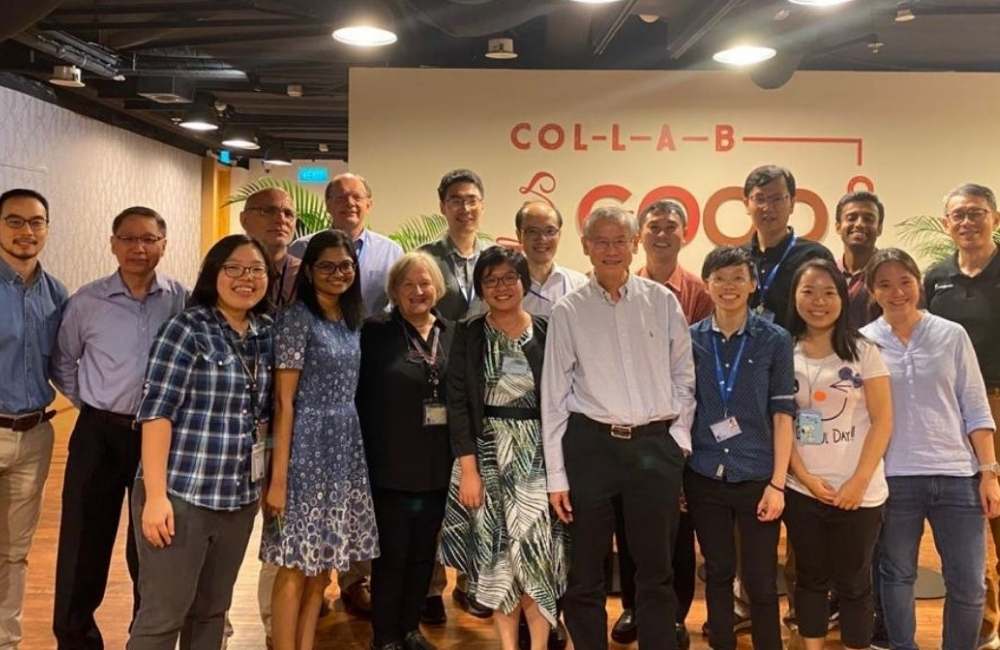A*STAR NEWS
A*PECSS Supports Early Career Researchers To Seize Career Advancement Opportunities
From 14 to 16 September 2021, the A*STAR Postdoc and Early Career Scientist Society (A*PECSS), together with other postdoctoral fellow societies across Singapore, organised the inaugural National Postdoc Symposium. Attended by more than 800 early career researchers, postdocs and scientists, the three-day event discussed how early career researchers in the ecosystem can learn new skills, foster collaborations, and build greater resilience for the future. The symposium also offered a platform to discuss strategies for career advancement and transitions, development of soft skills such as critical thinking, engagement with industry, leadership and entrepreneurship and mental health.
 The A*PECSS team and other A*STAR colleagues at a networking dinner in March 2020, before the circuit breaker period. Teresa Ho (3rd from right, front row), President of A*PECSS, and Vice-Presidents Carol Yu (5th from right, front row) and Janaki Shanmugam (7th from right, front row) who represent SERC and BMRC, work together with the A*PECSS team to support the early career researcher community at A*STAR in their career development aspirations.
The A*PECSS team and other A*STAR colleagues at a networking dinner in March 2020, before the circuit breaker period. Teresa Ho (3rd from right, front row), President of A*PECSS, and Vice-Presidents Carol Yu (5th from right, front row) and Janaki Shanmugam (7th from right, front row) who represent SERC and BMRC, work together with the A*PECSS team to support the early career researcher community at A*STAR in their career development aspirations.
KEEPING ABREAST OF THE EVOLVING R&D LANDSCAPE
At the event, Guest-of-Honour Prof Low Teck Seng, CEO, National Research Foundation, shared his personal journey in science and technology with young researchers at the early stages of their academic careers. He advised that young researchers should look beyond academia, as there are many exciting opportunities in industry, government and even entrepreneurshp to explore. Prof Low shared his own experience, where he started out with an aspiration towards becoming an academic, but decided to pursue other interests such as being an entrepreneur as he moved forward in his career pathway.
We need to have people who are excited about what they're doing with passion, and young researchers today need to look beyond the endpoint of being at a university. Do something that's exciting to you.
– Prof Low Teck Seng, CEO, National Research Foundation
Dr Vincent Ho, Director of Human Health and Potential, National Research Foundation, shared about the major focus areas of RIE2025, and what these focal points and national efforts to integrate strategic scientific interests mean for the younger scientific community. He highlighted the opportunities early career researchers and postdoctoral fellows can capitalise on, with the emphasis on strengthening basic research to enrich Singapore’s scientific base and to nurture and anchor talent. He encouraged early career researchers and postdocs to keep abreast of Singapore’s evolving landscape as they build their scientific career.
DIVERSIFICATION OF CAREER TRACKS
The symposium focused largely on how postdocs and early career researchers can keep abreast of and seek out career development opportunities in research and beyond. The panel discussions over the three days covered opportunities in sectors such as industry, policy making, education, research services, NGOs, and entrepreneurship.
Postdoctoral and early career researchers form a vital part of our research ecosystem. Innovative and ground-breaking solutions which help propel our economy forward are often a product of early-stage research and early career researchers are a major driving force behind these efforts.
Traditionally, postdocs and early career researchers are developed to take the next step in their research career as a principal investigator, or in academia, as a junior faculty member. However, with the changing landscape in relation to job opportunities in other sectors beyond the bench, increased diversification of career tracks and supporting the professional growth of the early career researchers is imperative.
Dr Teresa Ho, co-chair of NPS and president of A*PECSS, said, “Although the pandemic has disrupted the career development of many professions, including scientists, it has reinforced the importance of developing deep scientific capabilities to solve global challenges. Postdocs and early career researchers, as the next generation of core scientific talent, are a key part of this endeavour. If there’s anything the pandemic has taught us – it’s that we, too, need to constantly adapt in the face of uncertainty, equip ourselves with new skills and pivot for the future. Ensuring early career rsearchers have access to the best mentors and resources to develop themselves will enable us to contribute meaningfully within A*STAR as well as the wider national ecosystem.”
The symposium was co-organised by A*PECSS, the NUS Yong Loo Lin School of Medicine’s Postdoctoral Association (NUS Medicine PDA), Duke-NUS Early Career ScientistAssociation (DUNES), the Mechanobiology Institute (MBI) Young Scientist Group, LKCMedicine Early Researcher Network (LEARN), and the Singapore Eye Research Institute (SERI).
Was This Article Helpful ?
A*STAR celebrates International Women's Day

From groundbreaking discoveries to cutting-edge research, our researchers are empowering the next generation of female science, technology, engineering and mathematics (STEM) leaders.
Get inspired by our #WomeninSTEM
